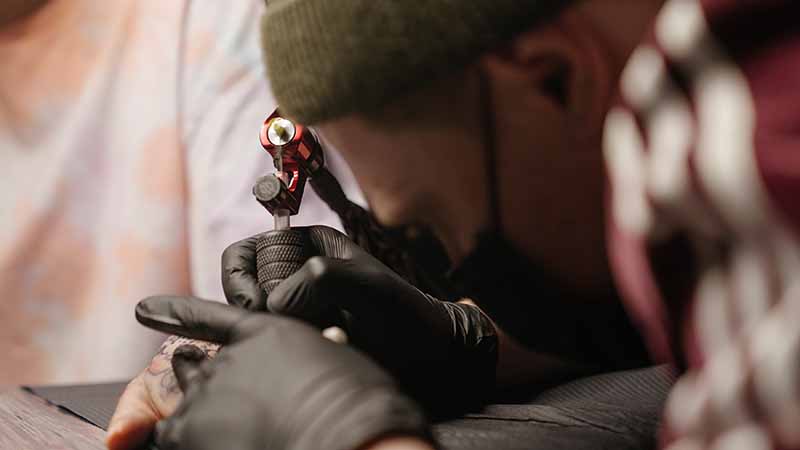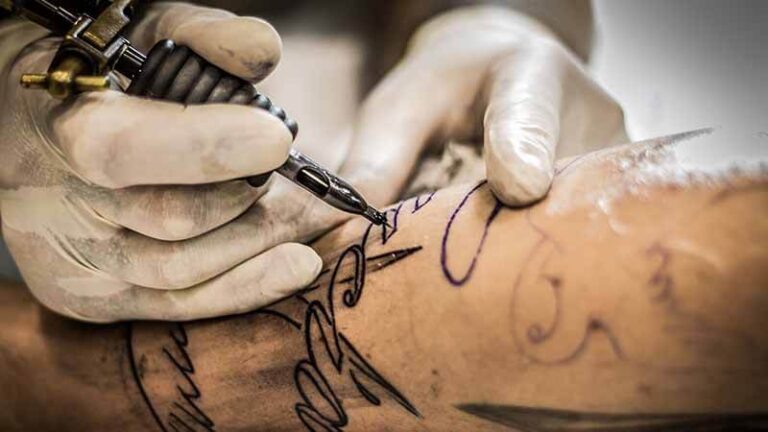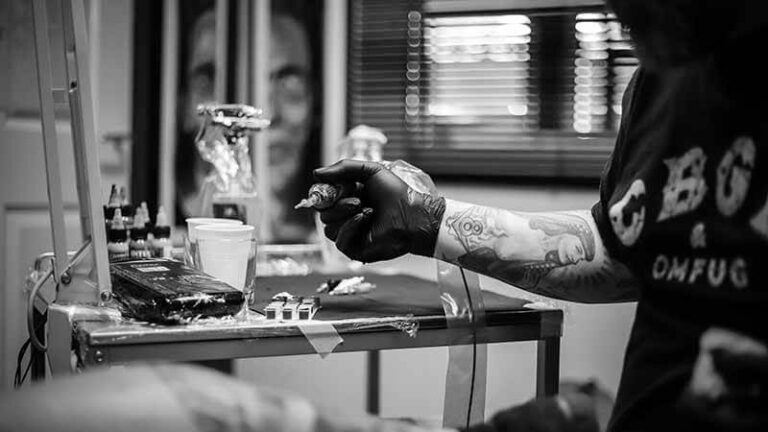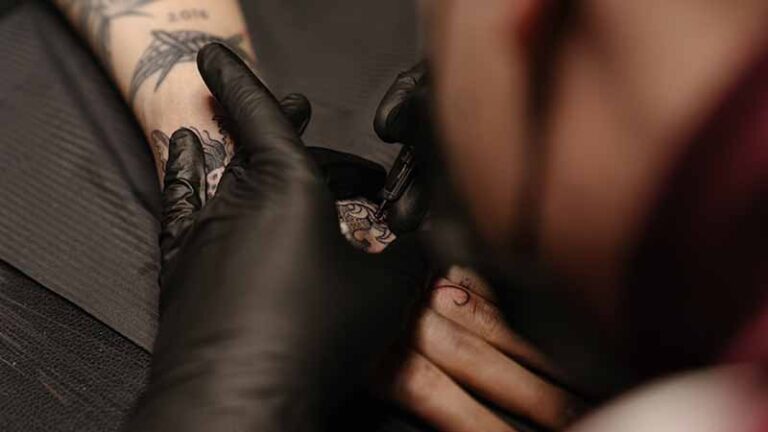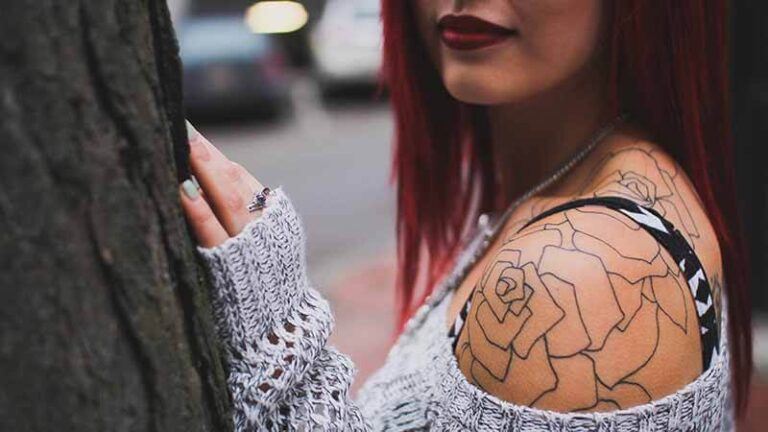How Long Do Lip Tattoos Last?
Lip tattoos are a type of cosmetic tattooing in which ink is tattooed onto the surface of the lips. They can be used to improve the natural shape and color of the lips, to make them appear fuller, or to add a pop of color. They have grown in popularity in recent years, particularly among those seeking a long-lasting alternative to standard lip makeup like lipstick or lip liner.
Lip tattoos are tattooed in the same way that other tattoos are. The tattoo artist will insert a needle into the top layer of the skin to deposit ink. However, tattooing the lips has some distinct obstacles and considerations. Lip skin is thin and sensitive, and the mouth is continuously moving and creating saliva, making it difficult for tattoo ink to set correctly. As a result, the tattoo artist may need to employ a unique technique to guarantee that the ink remains in place and the design appears crisp and clear.
The tattoo artist will usually start by administering a numbing lotion or gel to the lips to assist minimize pain and discomfort. They will next use a needle and ink to create the desired design, which may include outlining or coloring the lips. Depending on the complexity of the design and the skill level of the tattoo artist, the complete process might take anywhere from 30 minutes to several hours.
For a few days after the tattoo is finished, the lips may be puffy and uncomfortable. To guarantee appropriate healing and to reduce the risk of infection or other issues, it is critical to follow the aftercare guidelines offered by the tattoo artist. The color of the tattoo may fade or become less bright over time as a result of factors such as sun exposure, smoking, or natural aging. Some people prefer to have their lip tattoos touched up or completely removed, while others simply let them fade naturally over time.
How long do lip tattoos typically last?
A lip tattoo’s durability can be affected by a number of things. These factors include the tattoo artist’s competence and expertise, the quality of the ink and equipment used, the person with the tattoo’s aftercare procedures, and individual differences in healing and skin type.
Skill and experience of the tattoo artist:
A talented and experienced tattoo artist is more likely to create a high-quality, long-lasting lip tattoo. They will be familiar with the special problems of tattooing the lips and will be able to employ techniques that reduce the danger of fading or other complications.
Quality of ink and equipment used:
The quality of the ink and the equipment used can also affect how long a lip tattoo lasts. The high-quality ink is less likely to fade or get distorted over time, whereas poor-quality equipment increases the risk of infection or other consequences.
Aftercare practices:
Proper aftercare can help extend the life of a lip tattoo. This involves keeping the tattooed area clean and dry, avoiding excessive perspiration or friction on the lips, and avoiding activities that can produce excessive sweating or friction on the lips.
Individual differences in healing and skin type:
Finally, variances in healing and skin type might have an impact on the lifetime of a lip tattoo. Some people recover faster and more efficiently than others, and those with sensitive skin or a history of allergies may be more prone to problems or fading.
Lip tattoos often last between 1 and 5 years, depending on the reasons described above. Lip tattoos fade faster than other types of tattoos due to the frequent movement and moisture in the lips. They may, however, stay longer than other cosmetic tattoos, such as eyeliner or brow tattoos, which are subjected to less everyday wear and tear. Before getting a lip tattoo, it is critical to carefully explore your options, conduct research, and talk with professionals.
Tips for prolonging the life of a lip tattoo
Proper aftercare is essential for extending the life and vibrancy of a lip tattoo. Here are some tips for caring for your tattooed region to minimize fading or damage:
- Maintain cleanliness: Gently clean the tattooed area with mild, unscented soap and water. Avoid using abrasive items or cleaning the region too vigorously, as this can harm the tattoo.
- Avoid direct sunlight exposure: Sunlight can cause tattoos to fade and lose their brilliance over time. Avoid exposing the tattooed region to direct sunlight, and if you must be outside, use a hat or use sunscreen with a high SPF.
- Avoid harsh chemicals or skincare products: Exfoliants and acne treatments, for example, might cause tattoo damage or fade. Avoid using any items containing strong chemicals or acids on or near the tattooed region.
- Avoid activities that create excessive sweating or friction: Excessive sweating or rubbing the lips together might cause the tattoo to fade or distort. Avoid activities that can create considerable friction or sweating until the tattoo has healed completely.
- Moisturize on a regular basis: Keeping the lips moisturized might help prevent the tattooed region from cracking or drying out. Use a high-quality lip balm or moisturizer that is free of harsh chemicals and smells.
In addition to this general aftercare advice, there are specialized products or components that can help keep the tattoo’s color and integrity. Here are a couple of such examples:
- Vitamin E oil: As a natural antioxidant, vitamin E oil can help preserve the tattooed region from free radical damage and fading.
- Coconut oil: Coconut oil is a natural moisturizer that can help prevent tattooed skin from cracking or drying out. It may also aid in the protection of the tattoo from external harm and fading.
- Tattoo aftercare goods: There are numerous products on the market that are specifically intended for tattoo aftercare. These lotions frequently contain substances such as aloe vera, tea tree oil, or shea butter, which can promote healing and prevent tattoo damage.
- Sunscreen: Applying sunscreen with a high SPF to the tattooed area can help protect it from UV damage and fading caused by sun exposure. Look for a sunscreen that is made exclusively for use on the lips and is free of harsh chemicals and odors.
Overall, it is critical to follow the tattoo artist’s aftercare instructions and to apply high-quality, mild treatments on the tattooed region to ensure the longest possible longevity and brilliance of the lip tattoo.
What to expect if you decide to get a lip tattoo removed or retouched
Lip tattoo removal can be a tough and painful operation. Tattoo removal can be accomplished by a variety of procedures, including laser removal and excision (cutting out the tattooed region). However, because the skin around the lips is sensitive and prone to scarring, removing a lip tattoo can be especially difficult.
A high-powered laser is used to break down the ink particles in the tattoo during laser removal. This procedure can be uncomfortable, and it may take several sessions to thoroughly remove the tattoo. It can also be costly, with prices ranging from hundreds to thousands of dollars.
Excision entails removing the tattooed region and then reconstructing the surrounding skin. Because of the sensitive nature of the skin, this procedure can be useful for small tattoos but can be difficult to perform on the lips. It can also cause scarring, which may necessitate additional surgeries to correct.
Infection, scarring, and changes in skin texture or color are also potential concerns connected with tattoo removal. Before undergoing any tattoo removal techniques, it is critical to address these concerns with a skilled medical specialist.
Finding a reputable tattoo artist for touch-ups or revisions
If you want to get a touch-up or revision on your lip tattoo, you should look for a trustworthy and professional tattoo artist that specializes in cosmetic tattooing. Here are some ideas for locating a qualified artist:
- Request referrals: Request references for a good cosmetic tattoo artist in your region from friends, family members, or other trusted individuals.
- Online research: Look for online reviews and ratings for cosmetic tattoo artists in your area. Look for artists who have received excellent ratings and great feedback from prior clients.
- Examine portfolios: Most cosmetic tattoo artists will have an online or in-studio portfolio of their work. Look for an artist whose style and technique are similar to yours.
- Examine your certificates and licenses: Ascertain that the artist you select has the necessary certifications and licenses to do cosmetic tattooing in your state or location.
- Make an appointment: Once you’ve found a suitable artist, set up a session to discuss your tattoo and any changes or touch-ups you may require. This will give you a sense of the artist’s style and approach, as well as an opportunity to discuss any concerns you may have about the treatment.
Conclusion
Before getting a lip tattoo, it is critical to thoroughly analyze the dangers and drawbacks, as well as the potential benefits. Lip tattoos can be a terrific way to enhance your natural attractiveness and add color to your lips, but they do have certain dangers and cons.
Lip tattoos, for example, can be unpleasant and take a long time to heal. They may also fade or blur with age, necessitating touch-ups or changes. In addition, every sort of tattooing has the danger of infection or other problems.
It is critical to investigate lip tattoos and consult with professionals before making a decision to reduce these dangers and ensure that you are making an informed decision. Talking to a cosmetic tattoo artist, a dermatologist, or another healthcare professional who can provide you with additional information about the treatment and its potential dangers and advantages is one option.
You should also think hard about if a lip tattoo is the correct choice for you. This could entail considering your personal style and tastes, as well as your lifestyle and interests. A lip tattoo, for example, may not be the greatest choice if you frequently indulge in activities such as swimming or contact sports.
Finally, the decision to get a lip tattoo is a personal one, and it is critical to make the best selection for you. You can make an informed decision and secure the finest possible results from your lip tattoo by conducting research and talking with professionals.

